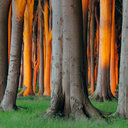Peony glycosides protect against corticosterone-induced neurotoxicity in PC12 cells.
キーワード
概要
Preclinical and clinical investigations have shown the involvement of dysregulation of hypothalamic-pituitary-adrenal (HPA) axis in the pathogenesis of depression. Hypercortisolemia and the associated hippocampal atrophy were observed in patients with depression, which could be ameliorated by the treatment with antidepressants. Therefore, neuroprotection has been proposed to be one of the acting mechanisms of antidepressant. Previous studies in our laboratory have demonstrated the antidepressant-like activity of total glycosides of peony (TGP) in mice. This study aimed to examine the effect of TGP treatment on corticosterone-induced neurotoxicity in cultured rat pheochromocytoma (PC12) cells. Treating the cells with corticosterone at 200 muM for 48 h caused apoptotic cell death. The cytotoxicity was associated with the activation of caspase-3 activity and the decrease in the mRNA ratio of bcl-2 to bax. TPG treatment at increasing doses (1-10 mg/l) protected against the corticosterone-induced toxicity in PC12 cells in a dose-dependent manner. The cytoprotection afforded by TGP treatment was associated with the inhibition of caspase-3 activity and the up-regulation of bcl-2/bax mRNA ratio. The anti-apoptotic effect of TGP is therefore likely mediated by the suppression of the mitochondrial pathway leading to apoptosis.


